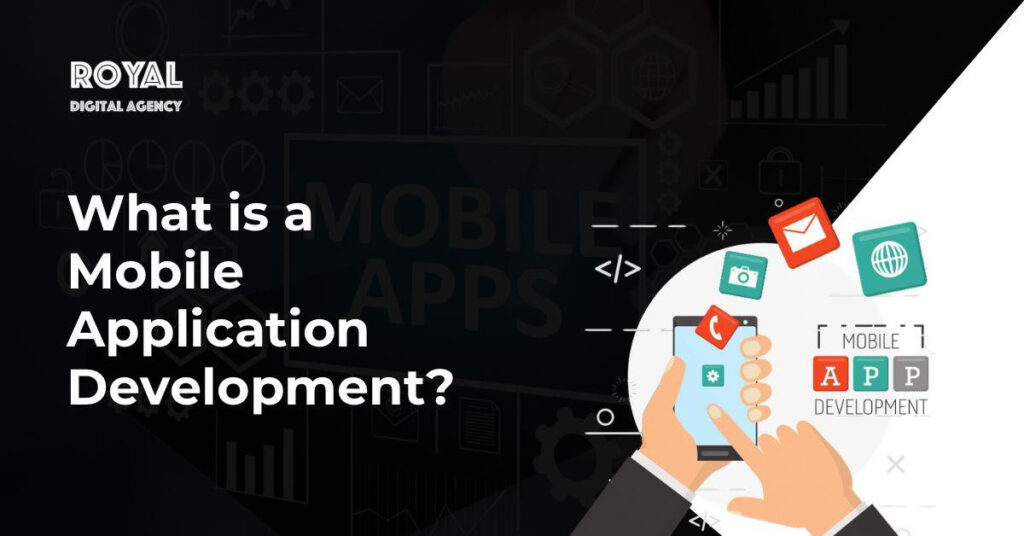Mobile app development is the development of software (app) for mobile devices such as smartphones and tablets. It covers writing code, designing user interfaces and integrating the app with the characteristics of the mobile device.
Unlike other types of software development, mobile apps harness inherent functions in battery free devices (e.g. GPS, Bluetooth, cameras, and microphones) to provide a smooth user experience. Mobile app development centers on deriving functionality to its best app and the chosen platform.
Most mobile app development market is dominated by two platforms, iOS and Android. Specific programming language, like Java, Swift, C# and HTML5 is used by developers generally to make apps as per the needs of the platform.
When it comes to mobile apps, they can be pre-installed on devices, or downloaded from the app stores or accessed from the mobile web browsers. Now used across business, e-commerce, health care and telecommunications. They’re becoming walking, talking, and transacting humans necessary to engage and transact in real time, in a convenient way.
When competitiveness on the web is a fact of life, mobile app development is no longer optional for your business, but a must. If you need an Android or iOS app development service to realize your vision. A reliable mobile app development & consulting service can help you go through it.
Firms can stay on top of the game, meet user wants and be able to produce apps that actually make a difference, with the help of a well-established mobile app development service organization.
Rapid Growth of Mobile Application Development
In the recent years, mobile application development has been growing rapidly. It aims in Mobile Application development is a field at creating applications to run on the Mobiles. Mobile apps specifically build for operating systems like iOS and Android. They use smartphones’ unique features to deliver a more user-friendly experience than just browsing the web on your phone.
And with more than 78% of the global population owning a smartphone what are they doing with it? Apps. The apps that cover lots of the issues include gaming, music and calendar, communication, and so on. You may have heard about or used popular mobile application development like Spotify, Headspace, WhatsApp, and Facebook, Instagram, and yes even our app Speedster App, a reliable delivery service in California, USA.
Choose a Platform
The selection of a suitable platform is the most important step in mobile app development. It boils down to your target audience, use case and your long-term goals. Here’s how to determine the best approach:
1. Understand Your Audience
- Android Dominance: This is for when you want to reach a larger audience, maybe most of them actually uses Android phones, and so it’s very useful. Independent developers like it because it is an open ecosystem, and there are fewer restrictions in the Google Play Store.
- iOS Retention: Working on iOS apps because they have more user retention which justifies the lower amount of optimization. This makes sense if your target audience uses iPhones mostly.
2. Single vs. Cross Platform Development
- Android or iOS First: If you have resources limited, perhaps you should begin with one. Android market share is much larger which is why many developers choose Android first.
- Cross-Platform Apps: When your app caters to different audiences, cross platform development using frameworks like Flutter or React Native will make sure your app works well on both Android and iOS. It’s especially useful for internal business apps where employees use different devices.
Business Goals and Monetization section
In Asia and Africa, users are all Android users, while North America and Europe, primarily users of iOS. And your choice should depend on geographical factors. Plan to monetize. iOS users may have a larger base but they usually do spend more.
Integration and Security
Integrating development tools with device management systems will improve your app’s performance. This is perfect for enterprise apps because security and efficiency are there.
It goes beyond technical decision, as the choice of platform is strategic, the app fits with your audience, and provides the business goals it can to serve.
Develop for both Android and iOS: Native apps or hybrid apps?
When deciding to develop a mobile application for both Android and iOS, you have two main approaches: native apps or hybrid apps. Each option has its pros and cons, opinions will vary based on yours aims and project criteria.
What Are Native Apps?
Native apps are those that are built coding for only one platform (Android or iOS) using their language and their APIs. This means Java or Kotlin for Android, and Swift or Objective C for iOS, native apps give you high performance and give you access to the device’s features such as the camera, GPS etc.
- Pros of Native Apps: Better performance, smoother user experience and full access to all device specific features come with native apps. If they have complex apps that involves heavy API usage then they are ideal because their apps need a lot of processing power like in the case of enterprise application or an app with heavy processing power usage.
- Cons of Native Apps: It can be time and money consuming to develop two separate apps for Android and iOS. Each platform has its codebase, which increases development time and budget.
What Are Hybrid Apps?
A hybrid app uses a single code base that deployed on Android and iOS. If uses these technologies to build them: HTML, CSS, and JavaScript run inside a native container. The fact that it only requires writing code once makes hybrid apps tend to be quicker and cheaper.
- Pros of Hybrid Apps: One codebase working both on platforms can save a lot of development time and money. For simpler apps or apps with simpler features that don’t need advanced access to device specific APIs, they are perfect.
- Cons of Hybrid Apps: Hybrid apps can sometimes slow down difference with performance than native apps and usually Hybrid apps get the least take of Android & iOS’s new features and Optimizations.
Which Option to Choose?
Native apps are necessary if you’re building a feature rich app that needs to run well and use device capabilities. If you need to save time and some budget, hybrid apps might just be what you are looking for. That entirely depends on whether your app needs niche (but active on other platforms), or broad (but inactive on other platforms), or on whether your target audience is broad (but inactive on other platforms) or niche (but active on other platforms).
Think Light: Building for a Mobile Platform
Usually, if you are developing a mobile application, you will find that limited resources on mobile device. Smartphones and tablets have much less processing power, memory and storage power than desktop computers or enterprise servers, for example. This might feel restrictive for mobile app development, if you’re used to have tons of resources for web applications.
- Optimization for a Limited Resource: Unlike traditional computers, mobile devices don’t possess the same capabilities. So, you need to change the way you work with your app to make it work in such limitations. To create that app at speed and with an efficiency. There will be no need for heavy or unnecessary features that may slow it down.
- Simple User Interface: A good user interface (UI) is one that is simple and intuitive for the user interface. Unlike desktop applications, a mobile app needs to have really simple layouts and be easy to navigate on a smaller screen. With a clean design without overwhelming the users, the most important functions should be put first in your UI. Just remember mobile users tend to want applications that are fast and simple to use. Capable of completing a single task in a few taps.
- Touch-Friendly Design: Touch apps have an interface that instead needs to be designed to work with gestures such as swiping and tapping. Apps need to be easy to use with type very few times. When it comes to designing for touch, buttons and other interactive elements should be large enough for people to be easily tapping them. But also think about including swipe actions to make the experience even better.
- Meeting User Expectations: Speed, simplicity and convenience are what mobile users want. They want apps to load fast, and they want apps to run smooth. By thinking about these, and being as light as possible with the design. You can build an app with good performance that is easy to use and fulfills users’ expectations of the ease of use and efficiency.
Offload Processing to the Cloud
What if your mobile app has to do more processing than the device can handle? Part of that additional processing can be offloaded to the cloud. With so much functionality now residing in the cloud, you can render cloud-based services without over burdening the mobile device.
- Utilizing Cloud-Based APIs: Using APIs is often one of the best ways to utilize cloud resources. These APIs let your app connect with cloud services in order to perform certain tasks without slowing down the mobile platform. For instance, you can use cloud servers to do jobs that require heavy processing, and then use the device for lighter duty tasks. With this you get a nice smooth user experience while actually powering capabilities that have great value.
- Data Storage and Caching in the Cloud: In addition, cloud can be used for data storage and caching to keep the device from containing large files or data. It frees up storage space, so when it’s no longer needed the App can run fast and smoothly. If you keep the data in the cloud, this makes synchronization across multiple devices easier as well.
- Using Cloud Services to Increase Functionality: What the cloud actually gives you is more than just processing power. As you move from device to cloud based services, you can add additional more advanced features. You may not have enough resources on the device to support alone. Examples include, you can integrate platform features such as push notifications, and AI powered like IBM Watson or IoT (Internet of Things) device integration. These then will enhance your app’s functionality in a way that makes your app more powerful as well as more user friendly.
It is the perfect choice if you’re developing a mobile app for Android or iOS. By offloading processing to the cloud one is enabled to streamline performance of their app and offload unnecessary processing. Thus making use of the cloud can be viewed as a worthy option for the developers engaged in mobile app development services.
Royal Digital Agency
Want to boost your business with a strong mobile app? We are a mobile app development company for Android and iOS and more committed to providing a piece of mobile application solution for companies around the world. One of the best examples of our work is Speedster, which is a dependable courier delivery app in California to ensure doorstep delivery service. Are you on the lookout for local app development services or custom courier delivery app development services, we’ll help just fine. Contact us now and we will make an app that can help your business succeed!
FAQs
Is mobile application development hard?
Mobile application development is certainly not an easy task and is pretty daunting for beginners. The first problem is that it requires knowledge in programming languages as well as principles of platform and design. Many can take months, years to master.
Are mobile app developers still in demand?
Yes, there’s demand for mobile app developers. The app development industry keeps growing and growing each year. Today there’re millions of apps on iOS and Android and global app spending reaching the $53 billion mark in 2024.
Does mobile app development require coding?
Of course, it takes coding to create a custom mobile app. But no code and low code platforms make it easy to create an app without a whole lot of coding knowledge.



